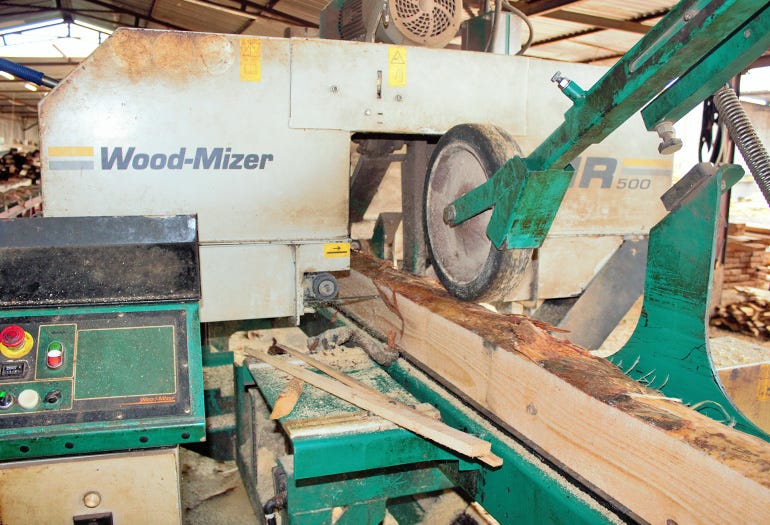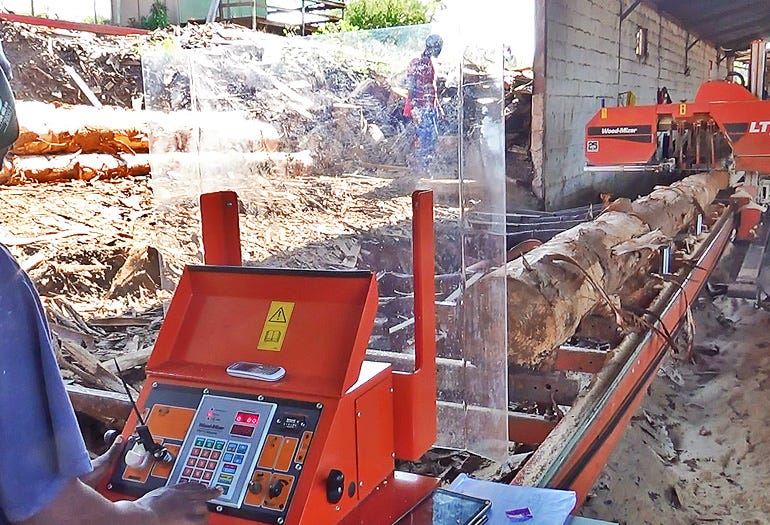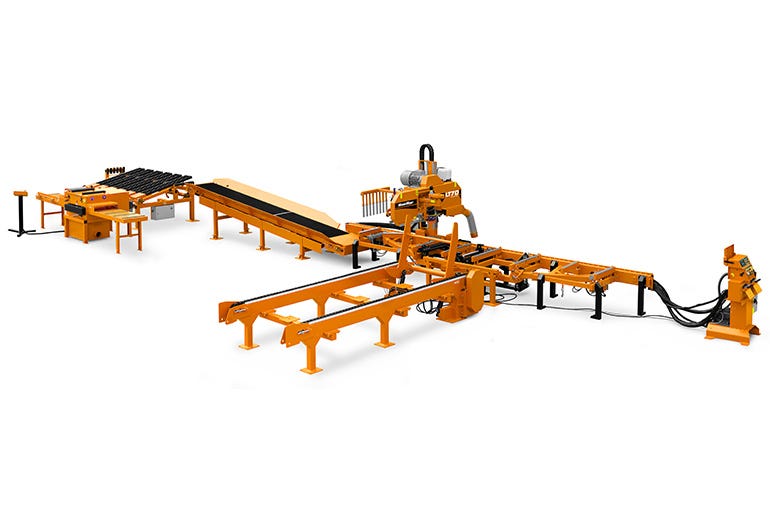June 22, 2016
South Africa’s Mpumalanga province near neighbouring Mozambique is known for its vast timber resources.
South Africa has about 1.3 million hectares (ha) of commercial timber plantations. Roughly 520 146 ha or 41% of those plantations are found in Mpumalanga.
As an important timber supply area, competition is rife between foresters and sawmillers to grow timber better and produce sawn timber more efficiently.
This is very often the factor that decides which grower or sawmiller remains standing for the next day’s trading.
Capio Lumber’s entry into the marketplace in late 2012 was set against this tough and competitive backdrop.
Despite knowing that it was entering a keenly contested playing field, Capio Lumber had a few cards up its sleeve that it knew it could use to make it competitive going into the future.
The first factor that smoothed its entry into the market was knowing into which markets it could sell its products. An association with a hardware store that it had ties with provided a ready market for most of the structural timber that it produced.
Furniture and pallet manufacturers who liked Capio Lumber’s quality and pricing gave further momentum to its start-off.
The experience of the Capio Lumber business partner team also gave the outfit a running start.
In addition to being family-in-law, Ross Scorgie and Bruce Moxham both come with formidable
track records in the timber production arena.
Ross Scorgie had grown the hardware enterprise with which Capio Lumber had ties with to a point where it could now sustain a sawmill. Better pricing and more product variety resulting from opening of the sawmill added momentum to the hardware sales, which also benefitted the sawmill.
Bruce Moxham’s exploits in the timber industry is legendary, having overseen a family owned timber enterprise of considerable size that was eventually sold to a listed company on the Johannesburg Stock Exchange.
The shared experience of Capio Lumber’s management team also made it easy to decide which equipment it needed to start and effectively compete in a tight market space.
Productivity was high on the priority list.
Capio Lumber needed reliable equipment that was easy to afford and could give them the output they needed to pay for the machines and grow the business. The affordability requirement also meant opting for equipment that was modular and could slot into the existing mill infrastructure as and when finances became avaialble.
Choosing equipment that was easy to maintain and that could reduce the amount of manual labour needed to produce the output Capio Lumber expected was also a priority.
Equipment with low energy costs and high recovery numbers which meant that less timber was wasted and more timber was available to sell, were also important factors to consider.
So too cutting quality.
The Capio Lumber management team needed equipment that could consistently produce precisely sized sawn material with the best surface quality that required less secondary processing and that the market was prepared to pay a premium for.
Wood-Mizer’s equipment range provided for all these requirements.


A Wood-Mizer two-head HR500 resaw operating at Capio Lumber
Wood-Mizer first choiceCapio Lumber’s first investment from Wood-Mizer included an LT20B electric sawmill and SHR-F Resaw.
Although the LT20 can cut logs into ready to sell timber, Capio Lumber easily doubled their output by investing in the resaw.
Costing less than having to buy a second sawmill, the resaw allowed the LT20B to only cut blocks with the resaw cutting the blocks into sawn boards and recovering waste that exited the sawmill.
This consistent search for increasing output in the most inexpensive way possible has remained a recurring theme in Capio Lumber’s growth to date.
The mill’s equipment checklist included until recently two Wood-Mizer LT20’s (Electric and Diesel), an LT70 Electric with hydraulic log handling capacity, an HR500 two-head resaw line, two SHR-F resaws and an EG300 board edger.
The never ending search for increased efficiency also paved the way for the January 2016 commissing of a Wood-Mizer LT70 Remote at Capio Lumber.
Powered by Wood-Mizer LT70 Remote
Capio Lumber’s focus on efficiencies that includes productivity, affordability, low labour and energy costs and maximum recovery convinced them that the LT70 Remote is the right machine to buy to grow the business further.


The LT70 Remote together with LT70 Electric and the two LT20’s now serve as Capio Lumber’s primary breakdown mills.
The LT70 Remote was developed as a semi industrial sawmilling solution for sawmillers that have outgrown the capacity of the non-remote LT70 sawmill range but do not want to commit to the required capital investment to buy a fully industrial sawmill like Wood-Mizer’s WM3500.
The LT70-Remote sawmill was actually unveiled in 2001.
It resulted from Wood-Mizer’s successful strategy to extend its narrow blade technology to its industrial range with the WM3500 and WM4000 key examples of the models in this range.
In terms of overall operation the LT70-Remote sawmill duplicates the operation of the WM3500 sawmill yet it costs 40% less. On the productivity front the LT70 Remote is only 30% less productive than the WM3500.
As business improves it is easy to add another LT70-Remote sawmill (or even an LT300 sawmill) and expand by the addition of equipment as opposed to buying one large scale piece of equipment.
The main 18, 5 kW motor permits cutting large diameter logs – and this power requirement is low compared with the power requirements of rival mills.
The LT70-Remote band sawmill productivity increase is mostly due to its integrated design that allows for a log to be processed into finished boards more profitably with minimal expense and labour.


Productivity increases with an integrated line design approach that allows for the efficient processing of logs into sawn timber
The Remote configuration pushes the production capacity of the LT70 to the absolute maximum with a Remote Operator Stand and adds a full range of conveyors and tables for moving logs to the sawmill and boards further down the line. All sawmill controls are centrally located and the operator has every control within easy reach at all times.
Each component’s function in the line is also synchronised to avoid ‘bottlenecks’.
The line can be configured to match the needs of individual businesses, and typically includes:
Log Deck - for staging and loading logs
Incline Conveyor - for transporting slabs and boards
Transfer Table - quickly directs waste, finished boards, and slabs for edging in three different directions.
Edger Multirip - for edging boards
Roller Tables - where needed
The LT70-Remote sawmill is also simple to maintain and operate. The electric and electronic designs are the same as on the LT70 Series and the new mill can be slotted into an existing line at minimal cost and disruption to the rest of the line.
The LT70 Remote sawmilling systems deliver maximum production using Wood-Mizer’s orange line of sawmills. The productivity, higher log yields, affordability and low operating costs make these systems viable solutions.
Final take
Capio Lumber’s focus on efficiency has allowed the mill to grow despite challenging market conditions.
Upgrading its mill for increased output while remaining price competitive and generating the profits it needed to run the mill while also expanding has meant that it had to be exceptionally vigilant about efficiencies.


High quality structural timber produced by Capio Lumber ready for shipment to customers
A large part of their success can be attributed to their equipment selection strategy that has given them the ability to run a streamlined operation that is geared for long term growth.



